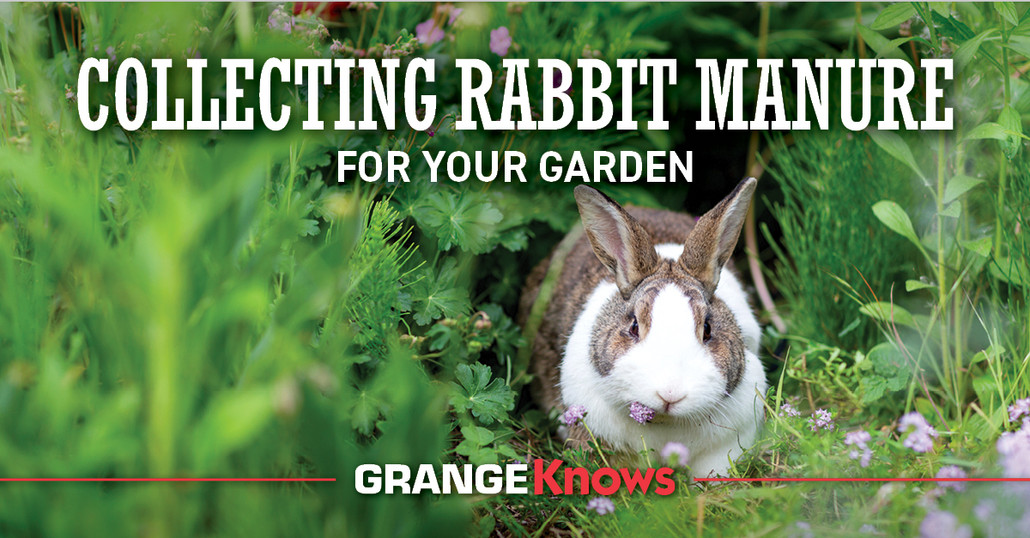
Collecting Rabbit Manure for Your Garden
Posted by Grange Co-op on 10th Dec 2024
When it comes to gardening, we all know there are a few, well, “unglamorous” aspects. Watering and mulching? Easy. But manure? Now, that’s a topic that could make even the most seasoned gardener squirm. Today, we’re diving headfirst into how rabbit droppings are beneficial for your garden.
Ready to hop into the world of rabbit manure? Buckle up because we’re going down the rabbit hole of gardening gold!
Why Use Rabbit Manure?
Unlike some other animal manures, rabbit manure for gardens is special. Rabbit manure, those little droppings from rabbits, is known as cold manure. Cold manure sounds like a strange term, right? Well, just think of it as a friendly, gentle fertilizer. Unlike chicken, horse, or cow manure, rabbit pellets can be directly applied to the soil, no waiting needed.
These other manures, known as hot manures, can burn your garden plants if used fresh and they need to be fully composted to be safe for use. With rabbit pellets, you can skip the lengthy composting process—just pick, sprinkle, and watch your garden thrive.
And the best part? Rabbit pellets are loaded with three of the most essential nutrients—nitrogen, phosphorus, and potassium. Rabbit manure has more nitrogen compared to other animal manure like cow and pig manure. These pellets also contain higher traces of phosphorus and potassium than chicken and sheep manure. Rabbit manure also contains beneficial elements like zinc, calcium, and magnesium.
Many nutrients are essential for healthy garden soil, but the main three are N-P-K (nitrogen, phosphorus, and potassium). Nitrogen helps plants get that lush, green look—think more leaves, stronger stems, and a generally happier vibe. Phosphorus is the root-deep enabler—helping plants grow strong roots, big blooms, and, yes, delicious fruits. Potassium? That’s your plants’ immune booster, keeping them tough and resilient against whatever Mother Nature throws their way.
Rabbit manure is also an excellent soil conditioner, since it’s a source of organic matter. Got soil that dries out faster than a desert in August? Rabbit manure helps retain moisture. Heavy clay soil that’s more brick than soil? Rabbit manure adds fluff, making things light and airy.
And let’s not forget fiber—rabbit pellets are high in fiber. Fiber helps loosen up your soil, which makes it easier for roots to grow and spread.
Rabbit Feed
Ever heard the saying “You are what you eat”? Well, it applies to rabbits too, and it’s actually good news for your garden. If your bunny’s munching on a diet of quality timothy-based pellets, hay, plus the occasional leafy green, their manure is basically nutrient-packed garden gold. It’s simple: when your rabbit eats better, your garden benefits!
Timothy-based pellets are the best for rabbits, and in turn, they create a nice, balanced fertilizer that’s gentle but powerful for plants. So every time you give your bunny a tasty, nutritious meal, remember—you’re also giving your garden a leg up. It’s an ecosystem of adorable, tiny paw prints and soil fertility!
Ways of Using Rabbit Manure
You’ve got the rabbit manure—now what? Here are some ways to get the most out of the manure in your garden:
Direct Application
This is the “no fuss, no muss” method. Take those pellets, sprinkle them around your plants, and let the soil soak up the nutrients. No composting needed. Just spread, cover lightly, and let nature take its course. The nutrients will break down over time, giving your plants a slow-release feast.
Compost Pile
If you’ve got a compost pile going, just add rabbit manure in. It’s like giving your compost a turbo boost! Rabbit manure helps other materials break down faster, which means your compost will be nutrient-dense and ready to spread sooner. And it’s totally safe—no need to let it sit for months like other types of manure.
Manure Tea
No, this isn’t for your morning cup of tea! “Bunny tea” is an infusion made by soaking rabbit manure in water. Let it sit for a few days, stirring occasionally, then pour it right onto your plants. It’s like a spa day for your veggies, hydrating them with nutrient-rich goodness. Whether you’re planting carrots or cosmos, a bit of bunny tea here and there can give your garden a refreshing boost.
 Tips for Collecting and Using Rabbit Manure
Tips for Collecting and Using Rabbit Manure
Alright, you’re sold. But collecting rabbit manure might sound like a weird hobby to anyone else, so here are a few tips to keep things running smooth:
- Collect often. Fresh is best! The fresher the manure, the more nutrients it’ll have. Rabbit droppings are small, dry pellets, which makes collecting them easy. Plus, regular collecting keeps things nice and tidy.
- Use the dedding. Bedding materials like hay and straw make great additions to compost. They’ll help balance out the “green” material in your compost with some needed “browns.”
- Apply directly. One of the best parts about rabbit manure is that you can put it straight onto the soil. Just sprinkle it around your plants and rake it in.
- Strain the manure tea. When you’re making rabbit manure tea, strain out the solids before pouring it onto your plants to avoid clogging up your watering can or hose. Plus, nobody wants chunky “tea”—even your plants have standards!
Everything You Need with Grange Co-op!
Need a little help with your rabbit manure operation? Grange Co-op has all the supplies to make this natural gardening technique a breeze. From bedding materials and composters to rabbit feed and gardening tools for the end result, Grange Co-op has your back—and your garden’s growth potential!
